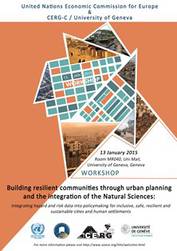13 January 2015
Venue: University of Geneva, Uni Mail, Geneva, Switzerland
Natural and human-induced hazards strongly affect vulnerable populations, especially the urban poor. These hazards, along with the effects of climate change, are posing unprecedented challenges to cities and human settlements, and they are a serious threat to the social and economic development of the UNECE region. The vulnerability of these hazard-prone regions is exacerbated by dense population in hazardous areas, environmental degradation, unsustainable use of water and natural resources, and poverty. Further impacts include the increasing value of buildings, an infrastructure that deprives many social groups of adequate and affordable housing, lack of access to information, and deficiencies in urban planning and governance in emerging countries and cities. Many of these impacts are the consequence of natural hazards, and they can be prevented if governments develop and implement urban planning tools and policies built from the Natural Sciences and related studies on hazards and risks.
This workshop will discuss the integration of hazards, risks analysis and Natural Sciences into policy making for cities and human settlements of the most vulnerable countries of the ECE region.
The workshop is jointly organized by UNECE Committee on Housing and Land Management and the Programme on Assessment and Management of Geological and Climate Related Risk - CERG-C of theUniversity of Geneva.
The workshop language is English.
The registration deadline for the workshop is 31 December 2014 (for applicants who need a visa letter - 15 December 2014).
To participate and for more information visit

